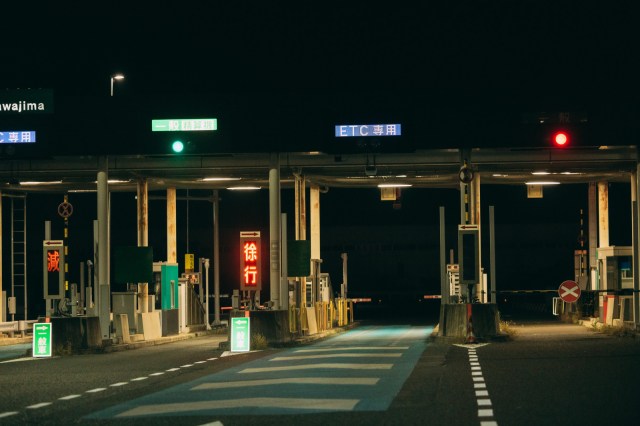
One of many modern conveniences evaporating on organized crime.
In 2011, the Japanese prefectural governments passed Organized Crime Exclusion Ordinances which prohibit companies from doing business with members of organized crime groups. While it’s unreasonable to expect convenience stores to screen every customer for criminal ties, it does make entering legal contracts extremely difficult for members of groups such as the yakuza.
It’s uncertain if this was intentional in the planning of the ordinances or not, but they have been making life increasingly more difficult for yakuza members as more and more services are based on contracts. For example, many yakuza members are finding themselves blackballed when it comes to getting new smartphones, and now it looks as if their days of driving on expressways are numbered as well.
In Japan, expressways require a toll, which traditionally is fed into a machine or toll booth operator who then grants entry. In 1997, Japan introduced the Electronic Toll Collection System (ETC) which allows cars to just whizz through tolls and pay when their transponder detects entry on high-speed roadways.
▼ If your ETC is all set-up then you can just cruise through the gate at about 20 kilometer per hour (12 miles per hour) without stopping.
Thanks to the convenience of ETC and its ability to reduce congestion, in 2020, the Ministry of Land, Infrastructure, Transport and Tourism announced that it intends to replace all toll booths with ETC lanes. It’s planned as a gradual replacement with total ETC saturation across the country envisioned by 2030. This will be very problematic for yakuza members, who will be blocked from signing up for an ETC card.
Actually, gang members have been able to apply for a card due to a loophole in the paperwork. While the terms and conditions state that members who are found to be associated with organized crime will have their membership revoked, there is no wording that forbids a gangster from applying and receiving a card in the first place, amounting to a de facto “don’t ask, don’t tell” policy.
▼ A demonstration of using an ETC card in action
As a result, nine yakuza members were arrested for having ETC cards between 2015 and 2021, but in each case, the charges were dropped because of the ambiguity of the contract wording. However, the six major highway companies in Japan announced that they would be rectifying this to refuse service to organized crime from the outset.
So, with this shoring up by the ETC operators and modernization of the infrastructure, it looks as if members of the yakuza will have to resort to the long routes when going places. However, some online comments weren’t sure that this was the best course of action when dealing with organized crime, both on practical and ethical grounds.
“It’d be better to ban them from owning cars altogether.”
“They can’t have an ETC, but they can have a driver’s license? Why?”
“It seems like having ETC cards would help the police to track them so maybe they should let them sign up.”
“Do cashless payment services have the same setup? I think the yakuza won’t be able to use those either.”
“Sounds like they’re making the jobs of toll booth collectors more dangerous.”
“Not that I support the yakuza, but even criminals should have human rights.”
“How are they buying cars and insuring them, then?”
We probably shouldn’t put it past organized crime groups to find ways around these ever-tightening restrictions on daily conveniences. Still, with the speed that contract-based services seem to be emerging and evolving, they’ll have a hard time keeping pace. For example, if Netflix does end up cracking down on shared passwords, the yakuza may be out of luck and forced to visit friends’ houses to watch future seasons of Bridgerton.
On the other hand, it would seem that the Organized Crime Exclusion Ordinances ought to make them immune to NHK collectors too, so I guess it isn’t all bad.
Source: Asahi Shimbun, Hatena Blog, Nikkan Gendai
Top image: Pakutaso
● Want to hear about SoraNews24’s latest articles as soon as they’re published? Follow us on Facebook and Twitter!

 Japanese Twitter users agree that yakuza members are more Photoshop savvy than the average joe
Japanese Twitter users agree that yakuza members are more Photoshop savvy than the average joe Yakuza member arrested for not picking up dog poop
Yakuza member arrested for not picking up dog poop Yakuza bosses struggling to upgrade phones from 3G
Yakuza bosses struggling to upgrade phones from 3G Yep, that’s illegal in Japan – Yakuza boss arrested for making supermarket point card
Yep, that’s illegal in Japan – Yakuza boss arrested for making supermarket point card Member of yakuza arrested for having honest job, dishonest application
Member of yakuza arrested for having honest job, dishonest application McDonald’s new Happy Meals offer up cute and practical Sanrio lifestyle goods
McDonald’s new Happy Meals offer up cute and practical Sanrio lifestyle goods Studio Ghibli glasses cases let anime characters keep an eye on your spectacles
Studio Ghibli glasses cases let anime characters keep an eye on your spectacles All-you-can-drink Starbucks and amazing views part of Tokyo’s new 170 meter-high sky lounge
All-you-can-drink Starbucks and amazing views part of Tokyo’s new 170 meter-high sky lounge Super Nintendo World expansion gets delayed for several months at Universal Studios Japan
Super Nintendo World expansion gets delayed for several months at Universal Studios Japan Beautiful Sailor Moon manhole cover coasters being given out for free by Tokyo tourist center
Beautiful Sailor Moon manhole cover coasters being given out for free by Tokyo tourist center Kyoto’s 100 Demons yokai monster parade returns!
Kyoto’s 100 Demons yokai monster parade returns! More foreign tourists than ever before in history visited Japan last month
More foreign tourists than ever before in history visited Japan last month The oldest tunnel in Japan is believed to be haunted, and strange things happen when we go there
The oldest tunnel in Japan is believed to be haunted, and strange things happen when we go there Studio Ghibli adds magic to your matcha with new tea ceremony whisk and bowl
Studio Ghibli adds magic to your matcha with new tea ceremony whisk and bowl The top 11 Japanese summer festivals, according to travellers
The top 11 Japanese summer festivals, according to travellers Disney princesses get official manga makeovers for Manga Princess Cafe opening in Tokyo
Disney princesses get official manga makeovers for Manga Princess Cafe opening in Tokyo Starbucks reopens at Shibuya Scramble Crossing with new look and design concept
Starbucks reopens at Shibuya Scramble Crossing with new look and design concept Beautiful new Final Fantasy T-shirt collection on the way from Uniqlo【Photos】
Beautiful new Final Fantasy T-shirt collection on the way from Uniqlo【Photos】 Is the new Shinkansen Train Desk ticket worth it?
Is the new Shinkansen Train Desk ticket worth it? Foreign English teachers in Japan pick their favorite Japanese-language phrases【Survey】
Foreign English teachers in Japan pick their favorite Japanese-language phrases【Survey】 Japanese convenience store packs a whole bento into an onigiri rice ball
Japanese convenience store packs a whole bento into an onigiri rice ball We try out “Chan Ramen”, an underground type of ramen popular in the ramen community
We try out “Chan Ramen”, an underground type of ramen popular in the ramen community Studio Ghibli releases Kiki’s Delivery Service chocolate cake pouches in Japan
Studio Ghibli releases Kiki’s Delivery Service chocolate cake pouches in Japan Japan’s bone-breaking and record-breaking roller coaster is permanently shutting down
Japan’s bone-breaking and record-breaking roller coaster is permanently shutting down New definition of “Japanese whiskey” goes into effect to prevent fakes from fooling overseas buyers
New definition of “Japanese whiskey” goes into effect to prevent fakes from fooling overseas buyers Our Japanese reporter visits Costco in the U.S., finds super American and very Japanese things
Our Japanese reporter visits Costco in the U.S., finds super American and very Japanese things Studio Ghibli unveils Mother’s Day gift set that captures the love in My Neighbour Totoro
Studio Ghibli unveils Mother’s Day gift set that captures the love in My Neighbour Totoro Foreign passenger shoves conductor on one of the last full runs for Japan’s Thunderbird train
Foreign passenger shoves conductor on one of the last full runs for Japan’s Thunderbird train Domino’s Japan now sells…pizza ears?
Domino’s Japan now sells…pizza ears? New Japanese KitKat flavour stars Sanrio characters, including Hello Kitty
New Japanese KitKat flavour stars Sanrio characters, including Hello Kitty Kyoto creates new for-tourist buses to address overtourism with higher prices, faster rides
Kyoto creates new for-tourist buses to address overtourism with higher prices, faster rides Sales of Japan’s most convenient train ticket/shopping payment cards suspended indefinitely
Sales of Japan’s most convenient train ticket/shopping payment cards suspended indefinitely Sold-out Studio Ghibli desktop humidifiers are back so Totoro can help you through the dry season
Sold-out Studio Ghibli desktop humidifiers are back so Totoro can help you through the dry season Japanese government to make first change to romanization spelling rules since the 1950s
Japanese government to make first change to romanization spelling rules since the 1950s Ghibli founders Toshio Suzuki and Hayao Miyazaki contribute to Japanese whisky Totoro label design
Ghibli founders Toshio Suzuki and Hayao Miyazaki contribute to Japanese whisky Totoro label design Doraemon found buried at sea as scene from 1993 anime becomes real life【Photos】
Doraemon found buried at sea as scene from 1993 anime becomes real life【Photos】 Tokyo’s most famous Starbucks is closed
Tokyo’s most famous Starbucks is closed One Piece characters’ nationalities revealed, but fans have mixed opinions
One Piece characters’ nationalities revealed, but fans have mixed opinions We asked a Uniqlo employee what four things we should buy and their suggestions didn’t disappoint
We asked a Uniqlo employee what four things we should buy and their suggestions didn’t disappoint Princesses, fruits, and blacksmiths: Study reveals the 30 most unusual family names in Japan
Princesses, fruits, and blacksmiths: Study reveals the 30 most unusual family names in Japan Get the most out of your visit to Japan with these tourist-only deals 【Ninja Life Skills】
Get the most out of your visit to Japan with these tourist-only deals 【Ninja Life Skills】 Sip your coffee like a yakuza boss at Nagoya’s newly opened Ninkyo Cafe
Sip your coffee like a yakuza boss at Nagoya’s newly opened Ninkyo Cafe Japanese government encouraging hot springs to ease tattoo restrictions
Japanese government encouraging hot springs to ease tattoo restrictions Japanese Self-Defense Force mulls removing its ban on tattoos
Japanese Self-Defense Force mulls removing its ban on tattoos Pickax-wielding yakuza member ambushes movie star Beat Takeshi in Tokyo
Pickax-wielding yakuza member ambushes movie star Beat Takeshi in Tokyo Trick or Trafficking? Japanese mafia hand out candy to kids on Halloween, get away with it again
Trick or Trafficking? Japanese mafia hand out candy to kids on Halloween, get away with it again 10 yakuza members arrested for stealing sea cucumbers from ocean
10 yakuza members arrested for stealing sea cucumbers from ocean Taxi driver’s tip to stay safe: “The one thing you should say if you run into yakuza”
Taxi driver’s tip to stay safe: “The one thing you should say if you run into yakuza” Yakuza officially banned from giving kids Halloween candy by Japanese government
Yakuza officially banned from giving kids Halloween candy by Japanese government Kewpie dolls found in Asakusa have the face of an angel, the bottom of a brothel owner
Kewpie dolls found in Asakusa have the face of an angel, the bottom of a brothel owner Maid cafe manager who dated one of his maids says he was kidnapped and beaten by the yakuza
Maid cafe manager who dated one of his maids says he was kidnapped and beaten by the yakuza Yakuza-themed love hotel rooms! Great for couples, friends, and business meetings, owners say
Yakuza-themed love hotel rooms! Great for couples, friends, and business meetings, owners say Yakuza leadership airs complaints about COVID-19’s effect on money gains and operations
Yakuza leadership airs complaints about COVID-19’s effect on money gains and operations Fear and murder plague Western Japan golf courses over a checkbox on application forms
Fear and murder plague Western Japan golf courses over a checkbox on application forms 23-year-old Tokyo policewoman falls in movie-style love with yakuza member, real life ensues
23-year-old Tokyo policewoman falls in movie-style love with yakuza member, real life ensues
Leave a Reply